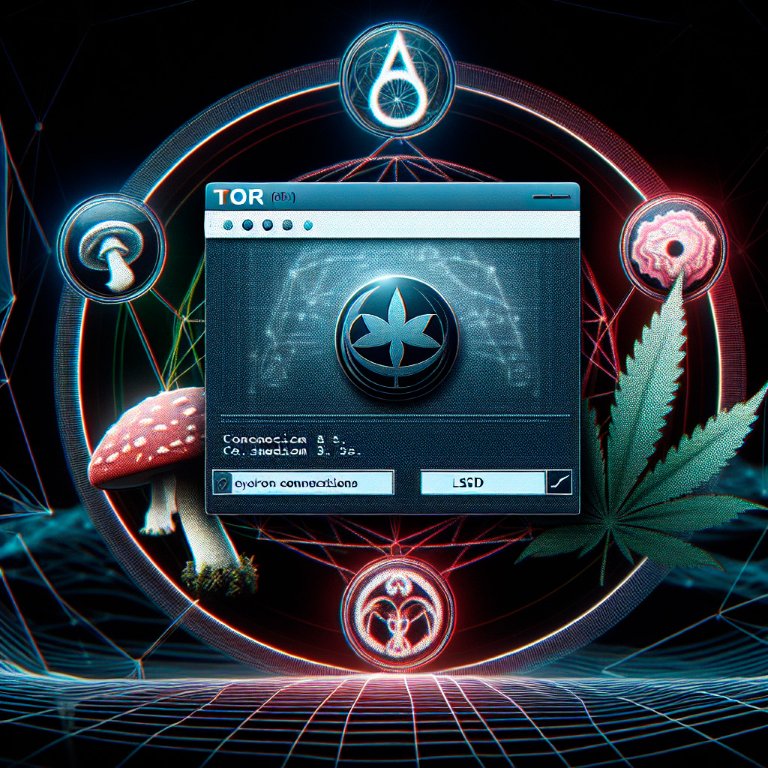Bitcoin dark web | Darknet Markets 2025
Bitcoin has become the primary currency for transactions on the darknet, facilitating the trade of goods such as drugs with enhanced privacy and security. Its decentralized nature and pseudonymous features make it ideal for users seeking anonymity. The integration of Bitcoin into darknet markets has streamlined transactions, reducing risks associated with traditional payment methods.
Darknet Markets 2025:
The dark web is part of the deep web but is built on darknets: overlay networks that sit on the internet but which can't be accessed without special tools or software like Tor. Tor is an anonymizing software tool that stands for The Onion Router — you can use the Tor network via Tor Browser.
| Darknet Market | Established | Total Listings | Link |
|---|---|---|---|
| Nexus Market | 2024 | 600+ | Onion Link |
| Abacus Market | 2022 | 100+ | Onion Link |
| Ares | 2025 | 100+ | Onion Link |
| Cocorico | 2023 | 110+ | Onion Link |
| BlackSprut | 2023 | 300+ | Onion Link |
| Mega | 2016 | 400+ | Onion Link |
Updated 2025-07-12

Bitcoin: The Top Choice for Darknet Commerce
Bitcoin has become the primary currency for transactions on the darknet due to its unique combination of security, anonymity, and decentralization. Unlike traditional payment methods, Bitcoin allows users to conduct transactions without revealing personal information, making it an ideal choice for decentralized trade. The pseudonymous nature of Bitcoin ensures that users can engage in commerce without exposing their identities, which is particularly valuable in environments where privacy is paramount.
The decentralized structure of Bitcoin eliminates the need for intermediaries, such as banks or payment processors, reducing the risk of third-party interference. This feature is especially beneficial for darknet markets, where participants rely on secure and direct transactions. Bitcoin's blockchain technology ensures that all transactions are recorded transparently, yet the identities of the parties involved remain concealed. This balance of transparency and privacy fosters trust among users, enabling seamless trade.
Bitcoin's role in facilitating drug trade on the darknet is significant. The currency's ability to provide secure and anonymous payments has streamlined the process of buying and selling substances. Sellers and buyers can transact without fear of financial surveillance, ensuring that their activities remain private. The efficiency of Bitcoin transactions also reduces delays, allowing for faster and more reliable exchanges.
- Bitcoin's pseudonymity protects user identities, making it difficult to trace transactions back to individuals.
- The decentralized nature of Bitcoin ensures that no single entity controls the network, enhancing security.
- Transactions are irreversible, reducing the risk of chargebacks or disputes.
Overall, Bitcoin's integration into darknet commerce has revolutionized the way transactions are conducted. Its emphasis on privacy, security, and efficiency has made it the preferred currency for users seeking a reliable and anonymous payment method. As darknet markets continue to grow, Bitcoin's role in supporting decentralized trade is likely to expand further.
Bitcoin Boosts Privacy and Security in Darknet Trade
Bitcoin has become the cornerstone of darknet transactions, offering users a secure and anonymous method for conducting decentralized trade. Its decentralized nature ensures that no single entity controls the network, reducing the risk of interference or censorship. This feature is particularly valuable for darknet commerce, where privacy is paramount.
Transactions on the darknet rely heavily on Bitcoin's pseudonymous design. Unlike traditional payment systems, Bitcoin does not require users to disclose personal information. Instead, transactions are linked to cryptographic addresses, making it difficult to trace the identities of participants. This level of anonymity fosters trust and efficiency in darknet markets.
- Bitcoin's blockchain technology ensures transparency and immutability, allowing users to verify transactions without relying on intermediaries.
- The use of encryption in Bitcoin transactions provides an additional layer of security, protecting users from potential breaches or fraud.
- Darknet markets benefit from Bitcoin's global accessibility, enabling seamless cross-border transactions without the need for currency conversion or banking systems.
By leveraging Bitcoin, darknet users can conduct transactions with confidence, knowing that their financial activities remain private and secure. This has significantly contributed to the growth and sustainability of darknet commerce, making Bitcoin an indispensable tool for decentralized trade.
Bitcoin's Role in Darknet Drug Trade
Bitcoin has become a cornerstone of transactions on the darknet, particularly in the drug trade, due to its secure and anonymous nature. The decentralized structure of Bitcoin ensures that transactions are not controlled by any central authority, making it an ideal medium for decentralized trade. This feature allows users to engage in transactions without the need for intermediaries, reducing the risk of exposure.
One of the key advantages of Bitcoin in this context is its pseudonymity. Users can conduct transactions without revealing their real identities, relying instead on cryptographic addresses. This layer of privacy is crucial for participants in the darknet, where anonymity is a priority. Additionally, Bitcoin transactions are irreversible, which minimizes the risk of chargebacks or disputes, further enhancing trust between buyers and sellers.
The use of Bitcoin also streamlines the payment process. Traditional payment methods often involve lengthy verification procedures, which can be impractical for darknet transactions. Bitcoin, on the other hand, enables fast and efficient transfers, even across international borders. This efficiency has contributed to the growing adoption of Bitcoin in darknet commerce, particularly in the drug trade.
Furthermore, Bitcoin's security features protect users from potential fraud. The blockchain technology underlying Bitcoin ensures that all transactions are recorded transparently and cannot be altered. This transparency, combined with the anonymity of users, creates a secure environment for decentralized trade.
In summary, Bitcoin's decentralization, pseudonymity, and efficiency make it a preferred choice for facilitating drug trade on the darknet. Its ability to provide secure and anonymous payments has revolutionized the way transactions are conducted in this space, offering a reliable solution for decentralized commerce.

Bitcoin's Role in Secure Darknet Trade
Bitcoin's decentralized nature and pseudonymous features make it an ideal payment method for darknet transactions. Unlike traditional financial systems, Bitcoin operates without a central authority, ensuring that transactions are not controlled or monitored by any single entity. This decentralization provides users with a level of financial autonomy that is particularly valuable in the context of darknet commerce.
The pseudonymity of Bitcoin transactions further enhances privacy. While transactions are recorded on the blockchain, they are linked to wallet addresses rather than personal identities. This allows users to engage in trade without revealing sensitive information, reducing the risk of exposure. For darknet markets, where privacy is paramount, Bitcoin offers a secure and efficient payment solution.
- Bitcoin's blockchain technology ensures transparency and immutability, making it difficult for third parties to alter transaction records.
- The absence of intermediaries reduces transaction costs and processing times, streamlining trade on darknet platforms.
- Users can generate new wallet addresses for each transaction, further enhancing anonymity and security.
These features make Bitcoin a preferred choice for darknet transactions, enabling secure and anonymous payments that support decentralized trade. By leveraging Bitcoin's unique attributes, darknet users can conduct business with confidence, knowing their financial activities remain private and protected.
Bitcoin Simplifies Drug Trade on the Darknet
Bitcoin has become the cornerstone of transactions on the darknet, offering a seamless and efficient method for decentralized trade. Its pseudonymous nature ensures that users can engage in transactions without revealing personal information, which is particularly advantageous for those involved in the drug trade. The decentralized structure of Bitcoin eliminates the need for intermediaries, reducing transaction costs and processing times significantly.
One of the key benefits of Bitcoin in darknet commerce is its ability to facilitate secure and anonymous payments. Unlike traditional payment systems, Bitcoin transactions do not require personal identification, making it nearly impossible to trace the parties involved. This level of anonymity is crucial for maintaining privacy and security in an environment where trust is paramount.
Additionally, Bitcoin's blockchain technology ensures that all transactions are recorded transparently and immutably. This feature not only enhances trust between buyers and sellers but also minimizes the risk of fraud. The use of Bitcoin in darknet markets has streamlined the process of purchasing and selling goods, making it faster and more reliable than ever before.
- Bitcoin enables borderless transactions, allowing users to trade globally without restrictions.
- The low transaction fees associated with Bitcoin make it a cost-effective solution for frequent traders.
- Its resistance to censorship ensures that transactions cannot be blocked or reversed by third parties.
In conclusion, Bitcoin has revolutionized the way transactions are conducted on the darknet, providing a secure, anonymous, and efficient payment method that supports the growth of decentralized trade. Its unique features have made it the preferred currency for those seeking privacy and reliability in their transactions.

Bitcoin: Safer Payments for Darknet Trade
Bitcoin has become the preferred method of payment on the darknet due to its ability to reduce risks associated with traditional financial systems. Unlike conventional payment methods, Bitcoin operates on a decentralized network, eliminating the need for intermediaries such as banks or payment processors. This decentralization ensures that transactions are not subject to third-party oversight, providing users with a higher degree of privacy and security.
One of the key advantages of Bitcoin in darknet transactions is its pseudonymous nature. While traditional payment methods require personal information, Bitcoin transactions are linked to wallet addresses rather than identities. This feature allows users to conduct transactions without revealing sensitive personal data, significantly lowering the risk of exposure.
Additionally, Bitcoin transactions are irreversible, which reduces the likelihood of chargebacks or disputes. In traditional payment systems, chargebacks can lead to financial losses and increased scrutiny. With Bitcoin, once a transaction is confirmed, it cannot be reversed, ensuring that both parties in a transaction are protected from fraudulent claims.
The use of Bitcoin also minimizes the risks associated with geographical restrictions. Traditional payment systems often impose limitations based on location, making it difficult for users in certain regions to participate in global commerce. Bitcoin, being a borderless currency, enables seamless transactions across the globe, fostering a more inclusive and efficient marketplace on the darknet.
Furthermore, Bitcoin's encryption protocols provide an additional layer of security. Each transaction is verified and recorded on the blockchain, making it nearly impossible to alter or counterfeit. This level of security ensures that funds are transferred safely, reducing the risks of theft or fraud that are more prevalent in traditional payment systems.
In summary, Bitcoin offers a secure and anonymous payment solution for darknet transactions. Its decentralized structure, pseudonymity, irreversible transactions, and robust encryption make it an ideal choice for users seeking to minimize risks and maintain privacy in their financial activities.
Bitcoin Boosts Safe and Private Trade in the Darknet
Bitcoin has become the preferred payment method in darknet commerce due to its unique combination of security, anonymity, and decentralization. Unlike traditional financial systems, Bitcoin operates without intermediaries, allowing users to conduct transactions directly. This feature is particularly advantageous for darknet markets, where privacy is paramount.
The pseudonymous nature of Bitcoin ensures that users can engage in transactions without revealing their identities. Each transaction is recorded on the blockchain, but the identities of the parties involved remain concealed. This level of anonymity is crucial for participants in darknet commerce, as it minimizes the risk of exposure.
Additionally, Bitcoin's decentralized structure eliminates the need for third-party oversight, reducing the likelihood of transaction interference. This makes it an ideal tool for facilitating trade in goods and services that are often restricted or prohibited in traditional markets. The efficiency of Bitcoin transactions further enhances its appeal, as payments can be processed quickly and with minimal fees.
Darknet markets have embraced Bitcoin not only for its privacy features but also for its ability to streamline transactions. The use of Bitcoin reduces the risks associated with traditional payment methods, such as chargebacks or account freezes. This reliability has contributed to the growing adoption of Bitcoin in darknet commerce, solidifying its role as a cornerstone of decentralized trade.

Bitcoin Enables Secure and Private Darknet Commerce
Bitcoin has become the cornerstone of darknet transactions, offering a level of anonymity and security that traditional payment systems cannot match. Its decentralized nature ensures that no central authority can monitor or control transactions, making it an ideal medium for decentralized trade on the darknet. Unlike traditional banking systems, Bitcoin transactions do not require personal identification, allowing users to engage in commerce without revealing their identities.
The pseudonymous structure of Bitcoin is particularly advantageous for darknet users. Each transaction is linked to a unique wallet address rather than personal information, providing a layer of privacy that is essential for secure operations. This feature enables participants to conduct drug trade and other transactions with reduced risk of exposure. Additionally, Bitcoin's blockchain technology ensures that transactions are immutable and transparent, yet the identities of the parties involved remain concealed.
Another critical aspect is the efficiency of Bitcoin in facilitating cross-border transactions. Traditional payment methods often involve delays, high fees, and regulatory scrutiny, which are minimized with Bitcoin. This efficiency is particularly beneficial for darknet markets, where speed and reliability are paramount. By eliminating intermediaries, Bitcoin reduces costs and enhances the overall user experience, making it a preferred choice for darknet commerce.
- Bitcoin's decentralization ensures no single point of failure, enhancing security.
- The pseudonymity of wallet addresses protects user identities.
- Transactions are immutable, providing a reliable record without compromising privacy.
- Cross-border payments are streamlined, reducing costs and delays.
In summary, Bitcoin's unique featuresdecentralization, pseudonymity, and efficiencymake it an indispensable tool for darknet users. Its ability to facilitate secure, anonymous payments has revolutionized decentralized trade, enabling participants to operate with confidence and privacy.